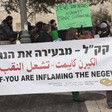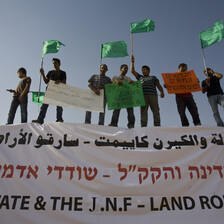The Electronic Intifada Silwan 9 December 2011

Evictions protested in Silwan, occupied East Jerusalem, 25 November 2011.
The postponement of an Israeli eviction order in East Jerusalem has spared the Somrein family from being made homeless — for the time being.
In the days leading up to the eviction deadline — which was scheduled for Monday, 28 November — family members, local residents and activists with Israeli settlement watchdog group Peace Now had been taking eight-hour shifts to monitor the Somrein home in the Silwan neighborhood in case Israeli police tried to force the family out.
As The Electronic Intifada previously reported, the family was served with the eviction notice on 2 October, but a court case over the house and land has been going on for years after the land was declared “absentee property” and handed over to a subsidiary company of the Jewish National Fund (JNF), Himnuta.
On the evening of 28 November, the head of the family, Mohammed Somrein, was overwhelmed with gratitude when the family lawyer informed him that the eviction order was indefinitely postponed. In celebration, he passed around knafa (a Palestinian dessert) to all those present.
Although the family have been given a few weeks respite, the threat of eviction continues to hang over their heads. The family believe that the decision to postpone the eviction was tactical in nature, merely to allow some time for the attention surrounding the case to die down. The family also believes that only a miracle will save it from the formidable machine employed by the JNF, an organization that promotes the dispossession of Palestinians.
The house and land in question is located in Wadi Hilweh, Silwan, just two hundred yards from al-Aqsa Mosque on the southern side of the Old City walls. The property belonged to Musa Abdullah Somrein, a man with Jerusalem ID. Hajj Musa, as he was known, passed away in 1983 and was buried in Jerusalem, while his burial certificate was issued by the Israeli Ministry of Interior. Today, Mohammed, Hajj Musa’s nephew, lives there with 11 other members of the Somrein family. Mohammed has lived in the house, with his uncle while he was alive, since he was five years old.
Despite Mohammed Somrein’s 48 years of residence in the house, and despite the fact there are legal documents clearly stating that the land is owned by the Somrein family, the land was declared “absentee property” after Hajj Musa’s death by the Custodian of Absentee Property.
Israel’s absentee property laws are the legal basis for Jewish settlement on Palestinian land. Enacted in 1950, the legislation rules that the property any person who was outside of the country at any point during the 1947-48 ethnic cleansing leading to the establishment of the State of Israel is subject to confiscation without compensation.
After an inexplicable series of transfers and land swaps, the Somrein family’s land ended up under the alleged control of the JNF. It, in turn, transferred the property to Himnuta. In 1991, Himnuta lodged a complaint against the Somrein family in the Israeli courts, demanding their eviction. Himnuta also started “billing” Mohammed retroactively for living on the property, with the bill amounting to more than 2 million shekels (approximately $537,000).
The JNF’s “distancing tactics”
In the days preceding the eviction deadline, the circumstances in this particular and already strange case took an even more bizarre turn. The Israeli daily newspaper Haaretz reported shortly before the eviction deadline that the JNF had issued a press release announcing a delay in the eviction (“JNF delays eviction of Palestinian family from East Jerusalem home,” 27 November 2011).
According to the actual press release, the JNF’s main intention was to distance itself from the Israeli settler organization Elad. According to the JNF, Elad is “the one who has full legal rights over the entire area, [and] has exercised the due process of the legal system of Israel” (“Silwan response [PDF]).
While Haaretz may have reported that the JNF delayed the eviction, the fact is that an Israeli court ruled — one day before the eviction deadline — to suspend it after the family, represented by their lawyer Mohammed Dahla, submitted a counter-suit to the eviction order. Another hearing is scheduled to take place on 18 December.
The timing of the JNF’s “distancing tactic” is certainly interesting. The JNF has been coming under heavy fire lately for its involvement in the Somrein case. Rabbis for Human Rights, the Sheikh Jarrah Solidarity Movement and the Jewish Alliance for Change have launched a public letter campaign against the JNF for their role in the Somrein case as well as other cases.
The JNF press release was actually issued in response to Rabbis for Human Rights’ campaign. Rabbis for Human Rights responded that:
“Court documents in our possession clearly indicate that Himnuta, a 100% KKL-JNF-owned subsidiary [KKF stands for the Hebrew name of JNF], has waged a legal campaign to have the Sumarin family evicted from their home … The response of KKL-JNF confirming the connection between Himnuta and Elad, combined with additional information that we have gathered, only reinforces the fact that the KKL-JNF and its subsidiary Himnuta bear responsibility for the pending eviction of the Sumarin family” (“Perseverance, small successes and the campaign continues,” 30 November 2011).
According to The Independent, Himnuta said it was open to dialogue with the family, nevertheless insisting that the family pay the 2 million shekels in “back rent” and, further, “future rent” (“Stories from the Old City: ‘We are not living like human beings,’” 30 November 2011).
However, neither Mohammed Somrein nor the family lawyer has been approached by Himnuta; and in any case, the family say they would never agree to pay rent for living in their own property on their own land.
The Somrein family are on tenterhooks awaiting the date of their hearing. As they wait, the family remain steadfast, knowing they are not alone in this fight, with the support of family, the people of Silwan, and Israeli and international solidarity groups.
Nadia Somrein lives and works in East Jerusalem and is a relation of the family facing eviction.



